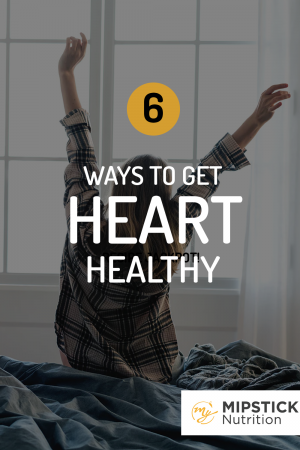January 31, 2020
Originally posted in February 2017. Updated to be even more awesome in February 2020!
How to Be Heart Healthy
We’ve all heard the scary statistics about heart disease. I’m sure you already know that heart disease is the number two killer of both men and women. I’m not here to convince you, but what I can do (in true BUILD Nutrition style) is help guide you on how to be heart healthy. Let’s make eating “heart-healthy” simple, delicious, and fun.

Risk Factors for Heart Disease
Before we dive into the “how” of being heart-healthy, let’s take a quick peek at a little data for you (sorry, I can’t help myself!)
The primary risk factors for heart disease are:
Heredity – Age – Lifestyle – Diet – Obesity – Diabetes
We can’t control the first two—our genetics (the heredity factor) or our age—but we can certainly do lots to manage the other ones. Eating healthfully, exercising regularly, reducing or managing stress, and maintaining a healthy weight and metabolism are factors that we absolutely have some degree of control over.
YAY, that’s good news!
How to Be Heart-Healthy – Eat Less of These
As far as diet goes, it was once believed that a high level of blood cholesterol and fats were the primary causal factor behind cardiovascular disease. However, new research suggests that partially hydrogenated fats and refined sugar are strongly linked to heart disease. We’re talking about the kinds of bad fats, like trans fats, found in processed, packaged, convenient foods like chips, crackers, pastries, and fast food; as well refined sugar (also found in most packaged foods).
The good news, if you live in Canada or the US, is that both countries have banned partially hydrogenated oils that produce trans fats. However, regardless of where you live, you can check your food labels. Look for any trans fats in the nutrition label or “partially hydrogenated” fats or oils in the ingredients list.
How to Be Heart-Healthy – Eat More of These
A heart-healthy diet is the same as any healthy diet really! Simply put, it’s about nourishing your body with whole foods that are high in nutrients that science shows support the way our bodies work, and in this case, we mean how your heart works. Eating real, whole foods is great for your health because many pre-packaged and processed foods are stripped of nutrients and become “empty calories.”
So what foods support the way your heart works? (We thought you’d never ask!)
Our Top 12 Heart-Healthy Foods.
SALMON: contains large amounts of omega-3 fatty acids, which helps reduce plaque build up in the arteries and decreases triglycerides
OATMEAL: the soluble fibre content in oatmeal can not only help lower cholesterol, but can also absorb cholesterol before it enters the bloodstream
BLUEBERRIES: rich in antioxidants such as anthocyanin; flavonoids that can decrease blood pressure and dilate blood vessels, to help reduce the risk of heart attack
DARK CHOCOLATE: rich in flavonoids, specifically known as polyphenols, that can aid in regulating blood pressure; regulates inflammation in the body
SOY: Rich in polyunsaturated fats and fibre, and can reduce high blood pressure and decrease LDL cholesterol levels
POTATOES: high in potassium that can aid in reducing the risk of heart disease
TOMATOES: a good source of lycopene, an antioxidant and carotenoid that helps lower the “bad” cholesterol levels, keeps blood vessels healthy, and lowers the risk of heart attack
NUTS: almonds, walnuts, pistachios, peanuts, and macadamias are full of Vitamin E and aid in managing cholesterol
EXTRA VIRGIN OLIVE OIL: the monounsaturated fats found in this oil can help decrease blood sugar and cholesterol levels, and reduce the risks of strokes and heart attacks by 30 percent
AVOCADO: high in potassium which helps to manage blood pressure
SPINACH: regulates homocysteine (an amino acid) and narrowing of the arteries
ORANGES: hesperidin, a bioflavonoid, may help blood vessels function better and therefore balance blood pressure in the body, and protect the arteries from damage
How to Be Heart-Healthy – Lifestyle Factors
Beyond eating a heart-healthy diet, there are other things that help you keep your heart strong and healthy for years and decades to come:
- Exercise regularly
- Mitigate stress
- Quit smoking (here’s how I did it—see reason #2)
- Ensure adequate quality sleep
- Maintain a healthy weight
References
[/fusion_title][fusion_text columns=”” column_min_width=”” column_spacing=”” rule_style=”default” rule_size=”” rule_color=”” hide_on_mobile=”small-visibility,medium-visibility,large-visibility” class=”” id=”” animation_type=”” animation_direction=”left” animation_speed=”0.3″ animation_offset=””]
Health Canada. (2018, September 17). Canadian ban on trans fats comes into force today. Retrieved from https://www.canada.ca/en/health-canada/news/2018/09/canadian-ban-on-trans-fats-comes-into-force-today.html
Statistics Canada. (2020, January 30). Table 13-10-0394-01 Leading causes of death, total population, by age group. Retrieved from https://www150.statcan.gc.ca/t1/tbl1/en/tv.action?pid=1310039401
U.S. Food & Drug Administration. (2018, May 18). Trans fats. Retrieved from https://www.fda.gov/food/food-additives-petitions/trans-fat
How to Be Heart Healthy
The entire contents of this website are based upon the opinions of Build Holistic Nutrition. Please note that Build Nutrition is not a dietitian, physician, pharmacist or other licensed healthcare professional. The information on this website is NOT intended as medical advice, nor is it intended to replace the care of a qualified health care professional. This content is not intended to diagnose or treat any diseases. Always consult with your primary care physician or licensed healthcare provider for all diagnosis and treatment of any diseases or conditions, for medications or medical advice, as well as before changing your health care regimen.
© BUILD NUTRITION 2026. ALL RIGHTS RESERVED. PRIVACY POLICY
Go ahead, creep us on social. You know you want to!
